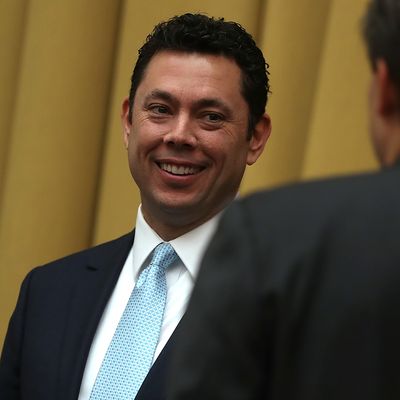
Last October, House Oversight Committee Chairman Jason Chaffetz was so excited about continuing to investigate Hillary Clinton in her new role as president that he couldn’t help but gush to the Washington Post. “It’s a target-rich environment,” Chaffetz said. “Even before we get to Day One, we’ve got two years’ worth of material already lined up. She has four years of history at the State Department, and it ain’t good.”
Then, of course, Donald Trump was elected and the Utah Republican found himself with very little to do (though many, including his colleagues on the Oversight Committee, asked him to probe the new president’s many business conflicts). Soon Chaffetz grew restless, and last month he announced that he may leave before the end of his term. Then, a week ago, he said he actually had to leave immediately to undergo surgery for a 12-year-old foot injury, and may not return to Congress for some time.
But Chaffetz, who’s still using a wheelchair, is already back in Washington, since GOP leaders are having a hard time rounding up enough votes to gut Obamacare and its protections for people with preexisting conditions. And though he’s still recovering, Chaffetz suddenly seems fired up about presidential oversight — when it comes to Barack Obama.
The former president has taken flak for accepting $400,000 to deliver a Wall Street speech in September, and USA Today reported on Wednesday that Congress may go after Obama’s $207,800 annual pension.
“The Obama hypocrisy on this issue is revealing,” Chaffetz told the paper. “His veto was very self-serving.”
The oversight chair then tweeted out the headline and a link to the story, with the note, “Yes, it will.”
To be fair, Chaffetz has been interested in limiting benefits for former presidents for some time, and the issue has bipartisan support. In 1958, Congress passed a law giving ex-presidents a pension and money for staff and office space after Harry Truman had to take out a loan, sell property, and publish his memoirs to support himself. Thanks to the paid-speaking circuit, today no former president is at risk of going broke, and last year Congress sent President Obama legislation, sponsored by Chaffetz, that would reduce payments to former presidents once their outside income exceeds $400,000.
Obama surprised Congress by vetoing the legislation last summer. White House Press Secretary Josh Earnest explained at the time that he was worried that the bill “would immediately terminate salaries and all benefits to staffers carrying out the official duties of former presidents — leaving no time or mechanism for them to transition to another payroll.” Earnest said Obama wanted to reform presidential pensions and would sign the bill if Congress made “technical fixes.” Lawmakers didn’t submit new legislation or attempt a veto override.
President Trump hasn’t taken an official position on the issue, but during the campaign he promised to “work on” reforming benefits for former presidents.
The spending bill that was just passed by the House, which keeps the government funded through September, provides $3.9 million for all the former presidents. It also allocates $61 million to reimburse local law enforcement for President Trump’s frequent trips to his private residences.
If Chaffetz can’t get his reform bill signed before he leaves office, there may be another solution: President Trump spends one less weekend at Mar-a-Lago, and we look the other way on Jimmy Carter’s lavish $430,000 benefit package.






























